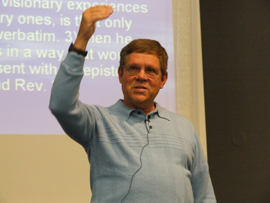To my new readers, thanks for taking the time to entertain some of these thoughts. To long-time readers, know I’m grateful for your continued clicks. My web-traffic has been increasing as of late so I’m trying to make some changes here. Know that I am grateful for your time – hope some of these posts are helpful to you.
As some of you may know, I have an appreciation for theology and pop-culture, and I admittedly, I get a little nerdy when the two intersect (or when I make them intersect). This is the second post in this series based on a lecture on I attended of Ben Witherington at Gordon Conwell Seminary this past fall. As he lectured on the topic of “humanity being created in the image of God”, I thought of Lady Gaga’s “Born This Way”. [Read more…]
 A couple months ago, I got to hear
A couple months ago, I got to hear 





Recent Comments